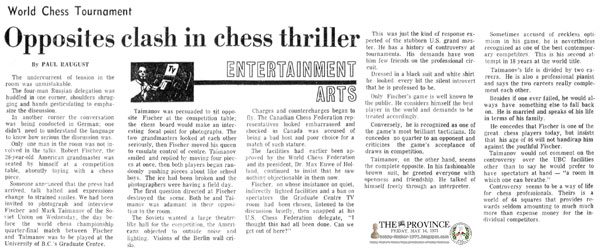The Province Vancouver, British Columbia, Canada Friday, May 14, 1971 - Page 3
World Chess Tournament - Opposites Clash in Chess Thriller by Paul Raugust
The undercurrent of tension in the room was unmistakable.
The four-man Russian delegation was huddled in one corner, shoulders shrugging and hands gesticulating to emphasize the discussion.
In another corner the conversation was being conducted in German; one didn't need to understand the language to know how serious the discussion was.
Only one man in the room was not involved in the talks. Robert Fischer, the 28-year-old American grandmaster was seated by himself at a competition table, absently toying with a chess piece.
Someone announced that the press had arrived, talk halted and expressions changed to strained smiles. We had been invited to photograph and interview Fischer and Mark Taimanov of the Soviet Union on Wednesday, the day before the world chess championship quarter-final match between Fischer and Taimanov was to be played at the University of B.C.'s Graduate Center.
Taimanov was persuaded to sit opposite Fischer at the competition table; the chess board would make an interesting focal point for photographs. The two grandmasters looked at each other seriously, then Fischer moved his queen to emulate control of center. Taimanov smiled and replied by moving four pieces at once, then both players began randomly pushing pieces about like school boys. The ice had been broken and the photographers were having a field day.
The first question directed at Fischer destroyed the scene. Both he and Taimanov was adamant in their opposition to the room.
The Soviets wanted a large theater-like hall for the competition, the Americans objected to outside noise and lighting. Visions of the Berlin wall crisis.
Charges and counter-charges began to fly. The Canadian Chess Federation representatives looked embarrassed and shocked as Canada was accused of being a bad host and poor choice for a match of such stature.
The facilities had earlier been approved by the World Chess Federation and its president, Dr. Max Euwe of Holland, continued to insist that he saw nothing objectionable in them now.
Fischer, on whose insistence on quiet, indirectly lighted facilities and a ban on spectators the Graduate Center TV room had been chosen, listened to the discussion briefly, then snapped at his U.S. Chess Federation delegate, “I thought this had all been done. Can we get out of here?”
This was just the kind of response expected of the stubborn U.S. grand master. He has a history of controversy at tournaments. His demands have won him few friends on the professional circuit.
Dressed in a black suit and white shirt he looked every bit the silent introvert that he is professed to be.
Only Fischer's game is well known to the public. He considers himself the best player in the world and demands to be treated accordingly.
Conversely, he is recognized as one of the game's most brilliant tacticians. He concedes no quarter to an opponent and criticizes the game's acceptance of draws in competition.
Taimanov, on the other hand, seems the complete opposite. In his fashionable brown suit, he greeted everyone with openness and friendship. He talked of himself freely through an interpreter.
Sometimes accused of reckless optimism in his game, he is nevertheless recognized as one of the best contemporary competitors. This is his second attempt in 18 years at the world title.
Taimanov's life is divided by two careers. He is also a professional pianist and says the two careers really complement each other.
Besides if one ever failed, he would always have something else to fall back on. He is married and speaks of his life in terms of his family.
He concedes that Fischer is one of the great chess players today, but insists that his age of 46 will not handicap him against the youthful Fischer.
Taimanov would not comment on the controversy over the UBC facilities other than to say he would prefer to have spectators at hand — “a room in which one can breathe.”
Controversy seems to be a way of life for chess professionals. Theirs is a world of 64 squares that provides rewards seldom amounting to much much more than expense money for the individual competitors.
★























